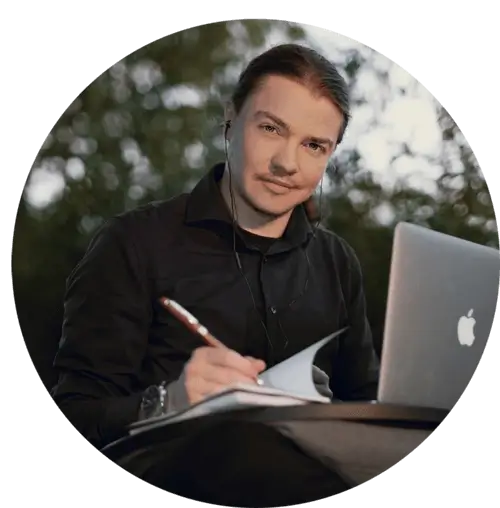How to learn French on your own: 7 critical steps
How can I learn French when I have no one to speak French with?
I get this question a lot. It seems that many people are in a situation where they are trying to learn French but they just don’t have anyone supporting them.
Today, I will share 7 critical steps that you need to take if you want to learn French and you currently don’t have anyone to speak French or learn French with.
If you like this video, click here to subscribe to my YouTube channel. I make videos about French learning strategy & mindset; the two things that are sorely missing from most French learning books & classes.

First, this might sound like bad news, but please stick with me, because I’ll show you how you can overcome this.
So, how can you learn French if you don’t have any French speakers around you?
To put it bluntly: you can’t. By definition learning and practicing a language requires communication, so you need at least one other human involved (and the more you have, the better).
But, if you follow the steps in this video, eventually you won’t be alone anymore and you’ll be able to learn French for good. So, let’s get into the steps.
Step 1: Start with Why
One of the very first video I made was about the ONE thing that makes the difference between succeeding at learning a language and failing at it - and how this was discovered randomly by language learning experts in the 1950s when their perfect miracle method swiftly turned into a massive failure. You can watch it by clicking here. The story is quite entertaining.
The big takeaway of that video is that the main difference between failing and succeeding is whether you have a very good reason to learn French or not.
It’s even more critical if you are learning French on your own. For most people who learn French successfully, their French learning journey is triggered by a situation or by people around them, such as marrying a French speaker, living in a French speaking country, or needing to speak French with colleagues.
If you’re in a situation where you have no one to speak to as you are learning French, it means that none of these traditional situations apply.
You want to get really clear on why you are learning French, because otherwise you have hardly any chance of success. Not because you don’t have anyone to speak to (that will be solved in the next few steps) but because you don’t have a strong reason why. So that’s Step 1, and Step 2 is taking this a bit further.
Step 2: Deepen your commitment
You might be wanting to learn French because it will help you get a better job, or get into a particular school or emigrate. These are all valid reasons that can justify wanting to learn French even if you don’t have any French speakers around you.
However, the issue with this unique situation is that your environment isn’t supporting you. When your environment isn’t conducive to learning, this means that you will need a lot of willpower to get it done.
You’ll only have enough willpower if you have a very strong commitment. So you want to make sure your commitment is deep and solid. I made a video that contains an exercise to strengthen your commitment and I strongly recommend you do this exercise, as step 2 in this process.
Step 3: Define what you’ll learn very specifically
Once you know why you’re learning French and your commitment is strong, it’s time to define exactly what you want to study.
If you’d decide to sign up for 1-1 coaching with me, we would do this step together at the very beginning of your coaching program. I make a personal curriculum for every single coaching client I have, because it’s very important to work on exactly what you need to learn specifically, so you don’t waste your time.
If you're not planning on learning with me right now, I recommend defining what you need to learn at this point of the process, because it will influence the next step.
I have a free worksheet which will help you define precisely what you need to study based on your goals. You can download the worksheet right here ⬇️

Step 4: Find a person or a group.
If your person is me or another coach who puts a strong emphasis on defining your specific curriculum, then step 3 and 4 will be inverted for you.
Else, you want to have step 3 completed before you look for a person or group, because you want to find someone whose goals will be aligned with yours.
It doesn’t really matter whether you sign up for a group class, hire a teacher or tutor, get a language partner or a study buddy, and it doesn’t matter if it’s online or offline, as long as you make sure that their goals align with yours and that they are have the ability and competence to support you on your journey.
If you consider signing up for a group class, ask the teacher if the things you wrote on the worksheet will be covered in the course. If not, then it’s not the right class for you.
If you choose to hire a 1-1 teacher or tutor, you can - and should - ask them to tailor your classes to include only what’s on your list.
Finally, if you decide to learn with a study buddy or a language partner, meaning someone who will study with you for free, exchanging their help for your help, you want to ask them to go through the first three steps as well and then make sure that their goals align with yours and that they will be as committed as you are.
The worst thing you can do at this stage is to find a friend who also “wants to learn French”, says “let’s do it together” and then have nothing or not much happen because the other person is just not committed.
Step 5: Commit to a schedule
Now that you have your curriculum well defined and a person to talk to, you want to commit to a schedule with that other person. If you’re signing up for a group class, just commit to show up for the class.
If it’s 1-1, you want to find a day and time that works for both of you.
As a coach, I’m staying flexible because some of my clients travel around the world, they might have changing schedules etc.
But if it’s at all possible for you, you should commit to the same time every week, or at the very least commit to some time slots and put them in your calendar.
And most importantly, you want to make sure that the other person is committed to showing up as well, especially if you aren’t paying them.
Step 6 - Set up your environment & implement habits to support your study
In step 2, we mentioned that if people around you and your environment are not naturally supporting your study, you will need a lot of willpower to get it done.
Now is a good time to change as many things as you can in your environment and your routine to make it easier for you to study.
I recommend you watch this video about boosting your French learning abilities by tweaking your environment. There are many ways you can tweak your environment a little bit and implement habits to make learning French easier on your brain. Now that you’re committed to learning French and playing full on, it’s a good time to do that. It will make it easier to stay motivated on the long run.
Step 7: Evaluate your progress periodically
From time to time, you need to make sure you’re still on track with your goals & you’re making progress. This step is also included in this worksheet. In fact, on the right side there is a built in system that allows you to visualize how much progress you’ve made so far, and how much you have left to learn. Of course this only works if you keep the worksheet up to date, so I recommend updating it once a month.
You can set a reminder in your phone to go off on the same day of every month to evaluate where you’re at in your French study and if your system is still working. Ask yourself these questions:
- Are you still on track?
- How much progress have you made since last time?
- Is your current way of studying efficient?
- What are the next things you want to work on?
- Is your person from step 4 still on track too?
- If no, why? Did they give up?
- Are they often unavailable?
- Do they have different goals than yours?
Unfortunately, it’s frequent among language partners and study buddies to just give up on learning French or be less committed after a while than they were at first.
In fact, even you might be less committed after a while. In this case, you want to return to step 2 and do the exercise again.
On the contrary if you are very committed and your person is not, sometimes you just need to accept it and find another person, that means you’ll have to do step 4 and 5 again.
Learning French on your own can be a very tricky challenge and you’ll often feel like you’re swimming against the current. But if you are really committed, it is absolutely possible to find the people that will support you, to grow together with these people and to reach the level of French that you want.
If you feel like you are stuck in your French study because your goals are so specific that you just can’t find a group, school or tutor that can really help you, or you would like some personal help for any other reason, I still have a couple of spots available for 1-1 coaching. You can book a call with me to speak about it via this link.

Your next steps
If you like this way of learning French, you will love to learn with me as a student or client. Please check out:
- My 1-1 coaching program, The French Transformation, if you need to improve your French fast.
- My group program, The French Fluency Accelerator, if you’d like to join a community of students from all over the world. We have weekly practice calls together and the best online video library to learn French.
Pro tip: you don’t need to choose!
All my 1-1 clients are invited to join the French Accelerator free of charge.
Feel free to book a call with me now to discuss options.
If you liked this, here's some more:
How to learn French with just one click

How to learn French in 5 minutes a day

About the Author

Angel Pretot is a French learning coach. He helps English speakers from all over the world learn French fast and become fluent. You can work with him one-on-one (online via zoom or a similar software) or join a global community of French learners in his group program the French Fluency Accelerator.